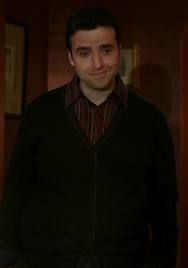Empathy
The Newsroom: Portrait of a Psychiatrist
An impressive psychiatrist emerges on this new HBO series
Posted August 21, 2012

HBO’s new TV series, “The Newsroom,” recently introduced a psychiatrist into the mix. Televised portraits of mental health figures play an important role in shaping the public perception of the field (an issue particularly pertinent to a profession that is so inherently reliant on mystery and likability). As a clinical psychologist myself I’d like to comment on the degree to which “The Newsroom’s” portrayal of the psychiatrist is positive and accurate.
In the service of this goal I’m going to comment on the “session” between Jeff Daniels-Will McAvoy and David Krumholtz-Dr. Jack Habib from this past week’s episode (The Blackout Part II: The Mock Debate).
First off, there’s something distinctly middle-eastern about Dr. Jack so bonus points to the show for creating a psychiatrist who isn’t a bearded, glasses-wearing White guy from the suburbs. Secondly, and more generally, Dr. Jack has established a particular aura (having appeared now on three of the last four episodes). He sits in his chair with a quiet, calm, observing demeanor. He seems to speak only after giving careful thought to what he’s going to say and he prioritizes his client’s voice much more than his own. This isn’t a caricature, or even a figure who succumbs to such common weaknesses as trying too hard to sound smart or stepping all over his client’s toes.
The show’s off to a good start establishing a credible, effective portrait.
Their very first exchange:
Will says: “That was a cliché.” (The scene picks up mid-sentence)
Dr. Jack counters: “I know, but if you stand in the rain without a jacket you’re going to get a cold. And if you have a physically abusive father who abandons you and your family you’re going to be a thousand times more sensitive to betrayal than the average person who’s already extremely sensitive to betrayal.”
Well, this is impressive. In a few simple sentences Dr. Jack not only shows that he can keep pace with Will’s intellectual heavy-weight tendencies (recognizing clichés, speaking in metaphors, speed of thought etc.), but he very accessibly and precisely delineates a fundamental facet of Will’s psyche. His personal history with an abusive father has endowed him with a relational template (how he perceives and experiences other people) that makes him prone to react with particularly intense vitriol to and an unwillingness to forgive interpersonal slights (in this case McKenzie’s past infidelity). Dr. Jack is effectively helping Will to see that when McKenzie cheated on him Will not only experienced the pain of that particular act, he re-experienced the childhood pain of his father’s abuses as well. In the same breath Dr. Jack even manages to normalize rejection sensitivity as a universal human experience. Kudos, Dr. Jack.
Next, Will distracts from the painful material (his feelings about his ex-lover’s affair) by going on a tangent about the encyclopedias on Dr. Jack’s shelf. After a sympathetic non-verbal gesture that also says “enough with the tangents” Dr. Jack redirects back to the topic in need of discussion. He keeps his eye on the prize (holding Will’s feet to the fire about what’s bothering him)—a cardinal rule for any effective therapist.
Next, Will describes his late-night internet surfing and how he came across a relationship-advice column that suggested the "cheatee" bears at least partial responsibility for the actions of the "cheater." You know, maybe McKenzie didn't just leave the relationship, maybe she was pushed away...
When Will asks Dr. Jack whether he agrees that Will should set some blame on his own shoulders for McKenzie’s infideliy Dr. Jack does another wise and effective maneuver—he answers the question with a question (“Do you (think you deserve blame)?” Now I know that in pop culture therapists are often derided for answering a client’s question with a question. It’s seen as evasive, cold and potentially ineffective. But if done with proper timing and a clear goal in mind then the therapist removes himself from the advice-giver role (a superficial, often ineffective role that most TV and film therapists end up playing) and toward a “helper” role in which the client is nudged toward arriving at his own authentic answer.
Again, kudos Dr. Jack.
Next, Dr. Jack gets back to this issue at hand—Will’s lingering, unresolved emotions about the McKenzie affair. Dr. Jack says: “You weren’t part of the equation.” He then utilizes a powerful intervention—perspective-taking. He accurately reflects to Will McKenzie’s experience of the affair (why she did it), thereby helping to clear away some distorted assumptions that Will’s been harboring. Basically Will’s personalized the affair (believing that McKenzie’s affair made her loving feelings for Will disingenuous—an understandable sentiment but not completely untrue). Dr. Jack helps to clarify that McKenzie’s affair-based actions had more to do with her own journey of rejection with Brian (the ex-boyfriend with whom she cheated on Will) and less to do with Will and the relationship between the two of them. This serves the function of building some empathy within Will for McKenzie, which, in turn, loosens up his ongoing passive aggressive hostility toward her. Dr. Jack is also modeling broader, more flexible thinking on the subject.

Next, after a few humorful quips and non-verbal gestures of acceptance, Dr. Jack listens to Will describe the fact that he can understand, intellectually that he needs to forgive McKenzie and that he still hasn’t been able to do so even though he would like to. He says that that he cannot do this, emotionally speaking, and he ends this open and vulnerable diatribe by asking “Why can’t I forgive her!?”
Dr. Jack replies: “Because you weren’t rejected, you were betrayed.” It’s a very powerful moment, and Will is duly thought-provoked by it. An intensely interested and concerned expression washes over Will’s face, as his perspective shifts and he starts to approach the idea of McKenzie with more empathy, and the idea of himself with more compassion. This is a moment of “good therapy,” in my opinion, an outcome that the two arrived at because the ingredients for “good therapy” have been administered. Dr. Jack used clear, insightful observations and a non-judgmental demeanor to help Will see that his emotional turmoil is more than understandable. Dr. Jack also previously modeled the tools (broader, flexible thinking, perspective-taking, acceptance of emotions, curiosity) that Will is now utilizing to more effectively introspect about his dysfunctional love life.
Dr. Jack doesn’t tell Will what to do, or obscure the issues, or even make Will feel bad for treating McKenzie badly. Thus far Dr. Jack is getting an ‘A’ in my book of psychiatrist-psychologist portrayals in the media.
Things I liked: During the session Will acts in restless fashion. He gets in and out of his chair, he paces around the office and he dominates the conversation (i.e. tangents, interruptions, etc.). Dr. Jack quietly tolerates it all, and I like that. There’s no undue sense of hierarchy spewing from Dr. Jack. Will can pace if he wants to, he doesn’t have to sit in his chair like a good little boy. And he approaches Will’s interpersonal briskness with humility. He doesn’t try to come off as a know-it-all (even though Sorkin has written his character as such), as he is always quick to preface his verbalized perceptions of Will, McKenzie and others with the necessary grain of salt.
Things I didn’t like: In Dialectical Behavior Therapy (DBT), an empirically-validated psychological treatment, there’s a preordained organization to what’s talked about in therapy. It helps to ensure that no issues of import are neglected. The DBT therapist first checks in on life-threatening issues, then therapy-threatening issues, then other important, recent stressors in the clients’ life etc. In this session, Dr. Jack makes no attempt to check-in on, let alone discuss, the stress in Will’s life due to the homicidal stalker that’s surfaced in recent weeks. A noteworthy missed opportunity in my mind.
Finally, I’ll add that the highly positive and accurate portrayal of Dr. Jack is further bolstered by Will’s favorable perception of him. Will is highly intelligent, demanding, arrogant and, as we’ve learned, sensitive to rejection. And yet Dr. Jack has created an environment in which Will is not only appreciative and responsive to Dr. Jack but uncharacteristically open and receptive. This is as compelling a piece of evidence as there is for the psychiatrist’s effectiveness.
Kudos thus far “Newsroom.” Hopefully this is the start of a beautiful relationship between Dr. Jack and the public perception of therapy.




